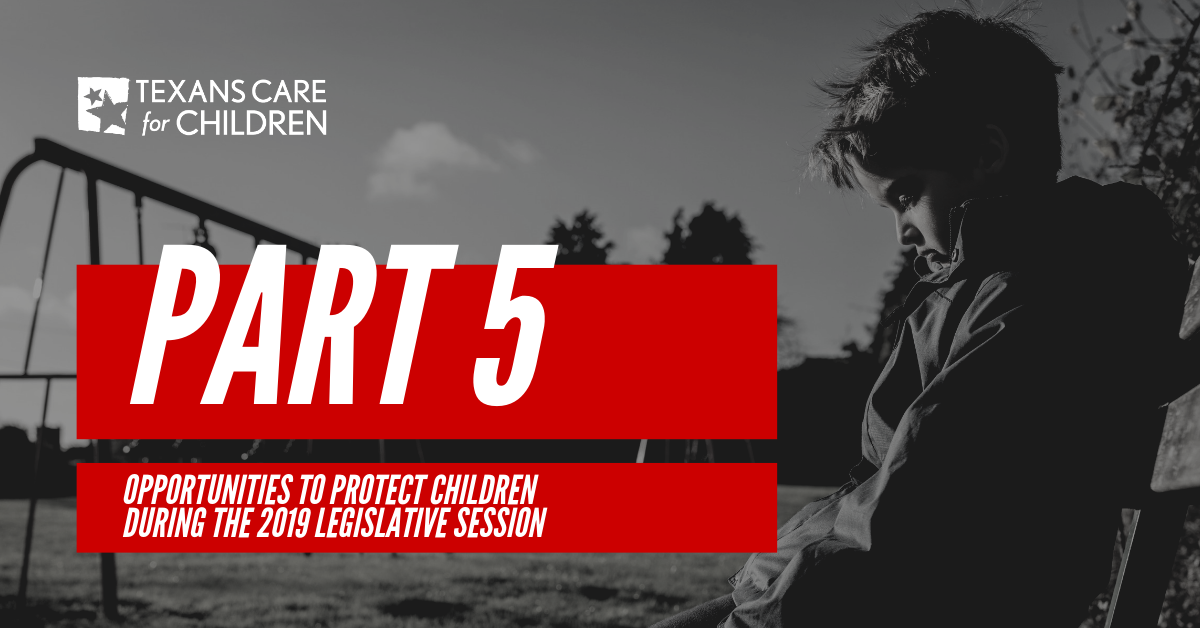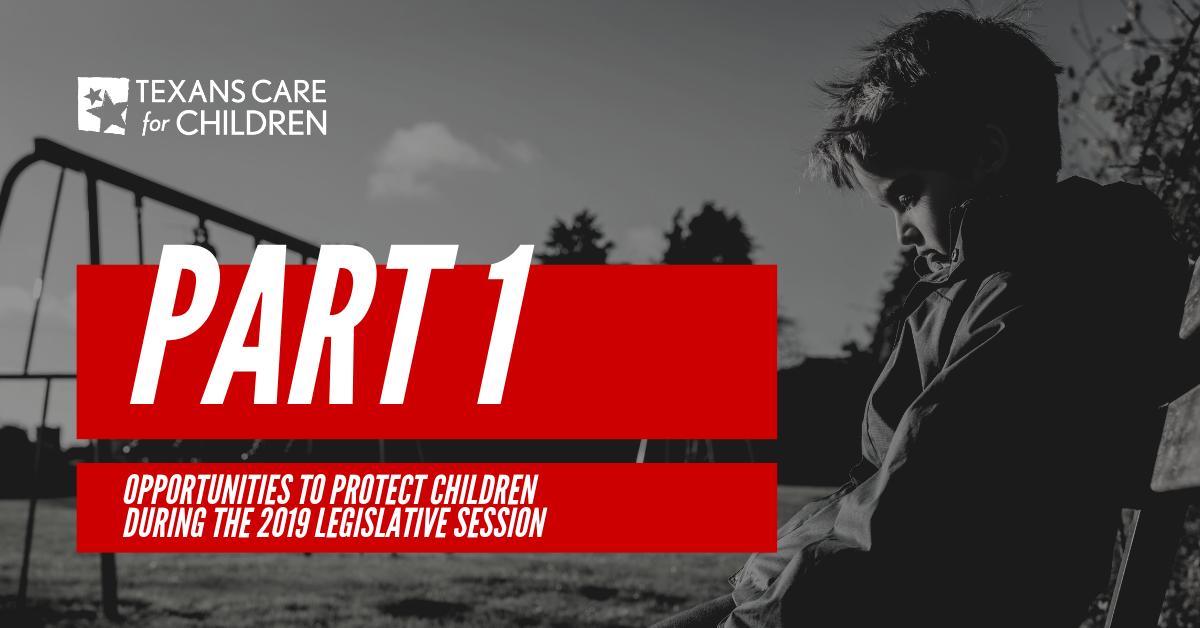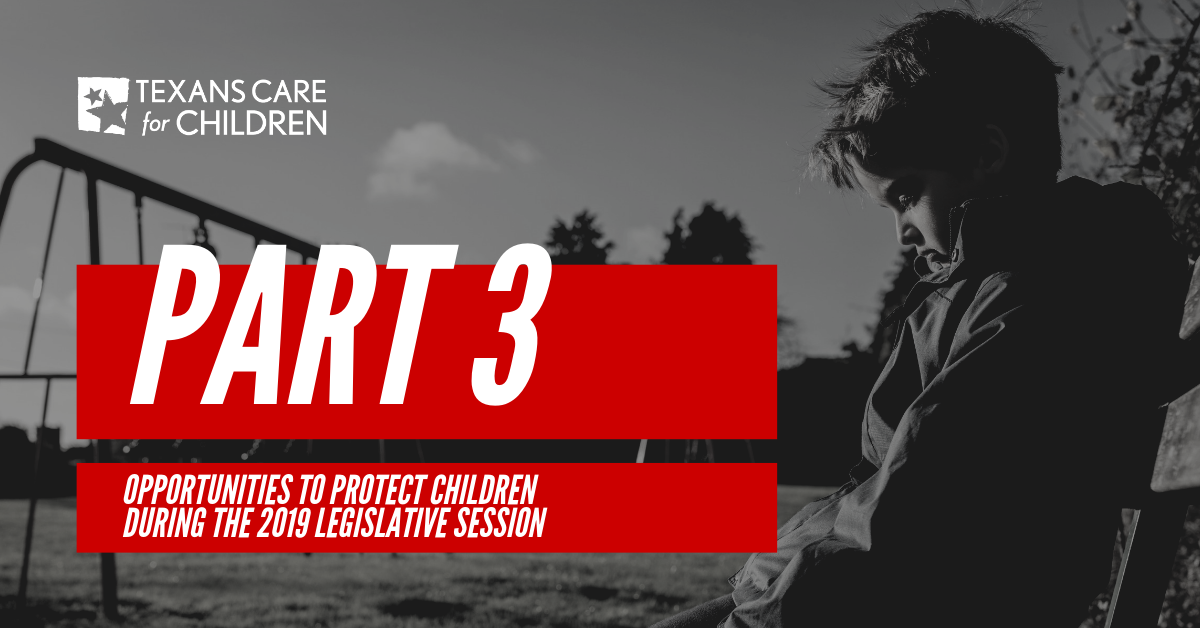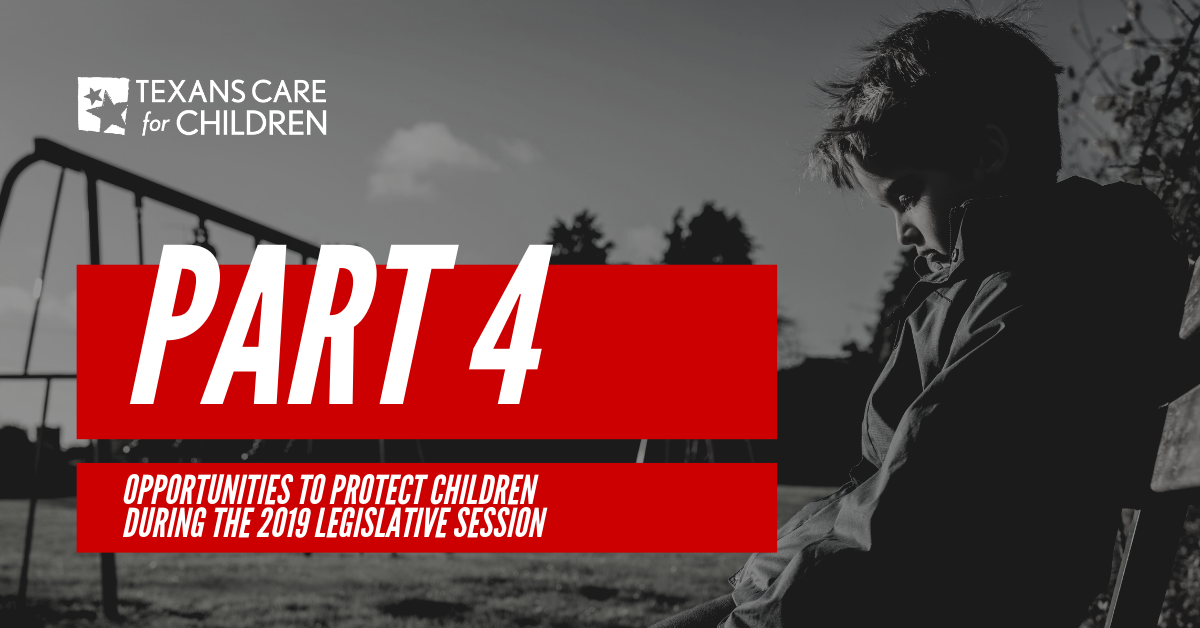This is part five of a five-part policy brief: Opportunities to Protect Children During the 2019 Legislative Session.
The lawsuit and many policy discussions focus on basic safety in foster care, but we must go beyond safety to ensure that children come out of foster care as successful students, professionals, citizens, and parents. Too often, children leave foster care and face challenges like homelessness, unemployment, low education attainment, criminal justice involvement, or untimely pregnancy. Below are recommendations for how the state can better ensure children in foster care are healing and thriving. These recommendations address supporting kinship caregivers, developing more high-quality foster care placements, and increasing support for older youth in foster care.
To Ensure Children are Healing and Thriving, Texas Must Make Sure More High-Quality Homes Are Available for Children in Foster Care
BACKGROUND ON KINSHIP CARE
When children cannot safely live with their birth parents, staying with extended family or close family friends can help children manage a challenging life transition and keep them connected to their existing support network and cultural identity.
Texas has long recognized the value of kinship care. In fact, in 2017 over half of children in foster care were living with a kinship caregiver. During the 2017 legislative session, HB 4 increased payment for kinship caregivers. The improved support should encourage more family members to take care of children who would otherwise be placed in a foster home or other licensed facilities.
Building on that effort, Texas should expand other non- financial support for kinship caregivers such as peer support or behavioral health services. The Legislature should be aware that the FFPSA allows the state to leverage federal dollars to offer prevention services for either the kinship caregiver or the child if not funded by other state sources. For example, if a child living with a grandparent needs behavioral health services to keep that child stable in that grandparent’s home, IV-E funding could be used to reimburse those services. Or, in-home parenting skills training could be offered to caregivers to ensure they feel well- equipped to add a child to their household. Texas will be able to take advantage of federal funding for these services once the state begins implementation of the FFPSA in two years. In the meantime, DFPS is proactively working to increase support for kinship caregivers and has already applied for and received a grant from the U.S. Administration for Children and Families to explore and develop a kinship navigator program. These programs, which exists in New York, New Jersey, Washington, and Ohio, offer support groups or peer support programs designed to help relative caregivers manage stress, understand basic information about the child welfare system, and refer participants to useful resources or services.
BACKGROUND ON FOSTER CARE PLACEMENT ARRAY
Texas leaders should take key steps to ensure there are enough safe, high-quality homes for children in foster care in order to reduce trauma experienced by children through multiple foster care placements, keep siblings together, and ensure children are in the most family-like settings rather than group care.
One of the main strategies that the state has used to build foster care capacity is Community Based Care (CBC), which is a community-based approach to meeting the unique needs of children, youth, and families. CBC in its current form started in 2017 but is part of a longer reform effort that started nearly a decade ago. Under CBC, a non-profit organization with a mission focused on child welfare, preferably with local ties, contracts with the state to recruit and identify quality foster homes or other living arrangements for children in state care and provide them a full continuum of services. Currently there is one active CBC model in the Fort Worth area, and new CBC contracts are in place in San Antonio and Northwest Texas around Abilene. There is a pending Request for Proposals to expand CBC to the Panhandle and the counties surrounding San Antonio. Following the passage of SB 11 in the 2017 session, the CBC contractor in the Fort Worth area, ACH Child and Family Services, was expected to take on case management services in addition to placement services. However, the transfer of case management services from the state to ACH has not yet occurred because of inadequate state funding to support a contract for these services.
One CBC tactic that can be replicated statewide is ACH’s use of a “placement portal” to help them match children in foster care in Fort Worth to the best home available and identify gaps in foster care capacity. During the 2017 legislative session, DFPS requested funds for a statewide placement portal, but the Legislature failed to support this request. Heading into the 2019 session, DFPS determined that a placement portal was so critical that DFPS began building the portal over the interim and included the portal into their budget request.
To help communities across the state ensure there is an adequate array of foster homes and treatment services and prepare for expansion of Community Based Care, in 2017 the Legislature directed DFPS to conduct a foster care needs assessment. The assessment, prepared with provider input, aims to help communities understand the needs of local children, the historical number of children placed in foster homes or other licensed facilities, and assess capacity gaps. The most recent assessment DFPS completed in August 2018 has helped local providers and CASA programs develop more regional capacity plans and build local capacity. A more meaningful assessment would cover the various placements that federal funds will support under the FFPSA, which will not only help Texas prepare for implementation of the FFPSA in 2021 but will also provide a more detailed analysis of the specific types of capacity lacking in different communities across the state.
RECOMMENDATIONS ON KINSHIP CARE AND PLACEMENT ARRAY
Maintain and expand support for kinship caregivers.
Fully fund Community Based Care.
Invest in the DFPS placement portal.
Conduct a more comprehensive foster care needs assessment to determine children’s needs and prepare for implementation for the FFPSA in 2021. The assessment should include placements for which the state will be able to continue receiving IV-E federal funding under FFPSA, including the following placements:
Foster family homes, including those that provide “treatment foster care” (a newly developed rate to allow more children with high needs to be served in a foster family home instead of an institution);
Qualified Residential Treatment Programs;
Providers specializing in prenatal, post-partum, or parenting supports for youth;
Supervised settings for youth ages 18 and older who are living independently; and
Providers specializing in supportive services for children and youth who have been found to be, or are at risk of becoming, sex trafficking victims.
To Ensure Children Who Age Out of Foster Care Will Thrive in Adulthood, Texas Must Improve Support for Transition-Aged Youth
BACKGROUND ON YOUTH AGING OUT OF FOSTER CARE
Youth who age out of Texas foster care tend to have worse outcomes compared to youth who exit care through adoption, permanent guardianship with a relative, or reunification. Poor outcomes may include criminal justice system involvement, lower reading and math skills, lower high school graduation rates, homelessness, unemployment and likelihood of long-term dependence on public assistance, and early pregnancy.
During the 2017 session, the Legislature recognized that transition-age youth in foster care needed special attention and, through SB 1758, directed DFPS to work with stakeholders to develop recommendations to improve outcomes for children exiting care to adulthood. The SB 1758 workgroup recommendations focus on improving the Preparation for Adult Living (PAL) curriculum to teach youth skills needed for successful adulthood and enhancing other transitional living services related to housing, education and employment, health care, and more.
RECOMMENDATIONS ON YOUTH AGING OUT OF FOSTER CARE
Support the SB 1758 Workgroup’s recommendations aimed at ensuring more youth exit foster care with the skills and supports they need to be successful adults.
Conclusion
Texas must build on the progress that state leaders have made to improve the child welfare system during the last two years. During the 2019 legislative session, we will work with the Legislature on these important issues to make sure families have the support they need to stay safely together and fewer children enter foster care in the first place. When children cannot safely stay with their families or kin and must enter foster care, Texas must not only continue to prioritize child safety, but must also ensure every child is able to heal and thrive.






